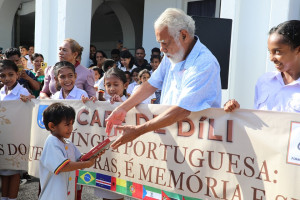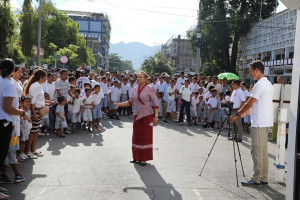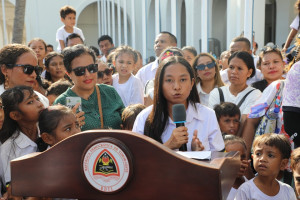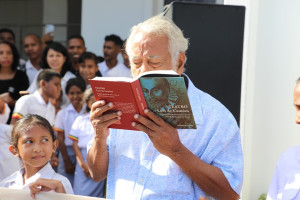This Monday, May 5th, Timor-Leste marked World Portuguese Language Day with a commemorative ceremony at the Government Palace, which brought together around 2,000 students and teachers from the CAFE (Centros de Aprendizagem e Formação Escolar) School Learning and Training Centers project and 4 de Setembro Secondary School of Dili, which are part of the CPLP’s Network of Friendly Schools. The initiative was attended by the Prime Minister, Kay Rala Xanana Gusmão, the Vice Prime-Minister and Coordinating Minister for Social Affairs, Mariano Assanami Sabino, and the Minister for Education, Dulce de Jesus Soares. 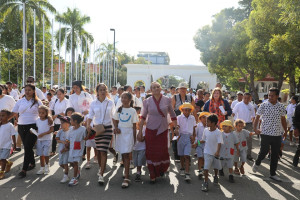
The event, in a clear demonstration of how Portuguese is valued and promoted in the national education system, highlighted the importance of the Portuguese language as a central element of national identity and an official means of communication, and as a fundamental pillar of education in the country. 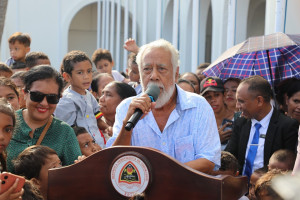
During the ceremony, the Prime Minister, Kay Rala Xanana Gusmão, called on parents and educational coordinators to encourage their children to learn Portuguese, stressing that the language is part of the history of the Timorese people. “State-building will be fragile if the people don’t master the official language, which is essential for communicating and writing quickly and clearly. That’s why it’s important to continue motivating children to attend school and to accompany them daily at home,” the Prime Minister said. 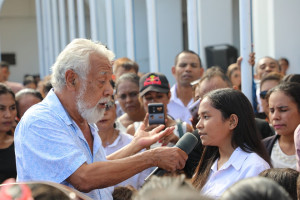
Xanana Gusmão also congratulated the students and teaching staff of the CAFE project: “I have a huge appreciation for your work,” the government leader said. He also sent a message of encouragement to the children of today, the adults “of tomorrow”, so that they “study and have a greater capacity to face the challenges of the future, namely the capacity to affirm Portuguese in ASEAN”. 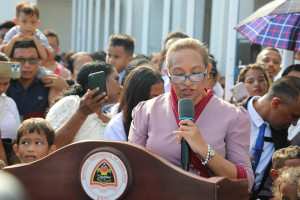
The Minister of Education, Dulce de Jesus Soares, highlighted the role of schools in teaching the Portuguese language and its integration into a space of shared values with the CPLP. “The celebration of World Portuguese Language Day reinforces our commitment to the Portuguese language, to freedom, dialogue and peace, being a bridge between the new generations and a global, inclusive and interconnected world.” 
In a message posted on the Ministry of Education’s social networks, the minister also said that “on this day we celebrate more than a language, we celebrate a deep connection, an identity that unites us with a global community and that throughout our history has been a symbol of resistance, struggle and hope. Portuguese is not just an official language of Timor-Leste, it is a bridge that connects us to the world, that gives us access to knowledge, opportunity and growth. It was in Portuguese that we made ourselves heard at crucial moments in our history and it is in Portuguese that we continue to build our future beyond our mother tongues.” 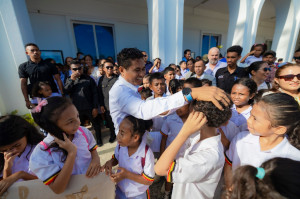
In his official message, Vice Prime-Minister Mariano Assanami Sabino recalled that the Portuguese language “was, during the darkest moments of the occupation, a link to the world, an instrument of denunciation and international solidarity, and above all, a voice in our struggle for freedom”. He also reaffirmed that Portuguese, enshrined as an official language in the Constitution of the Republic, continues to be a pillar of the state, present in education, justice, public administration and diplomacy. “With pride and determination, we will continue to affirm Timor-Leste as a country of peace, culture and multilingualism, where the Portuguese language will always be a symbol of resistance, freedom and hope,” he concluded. 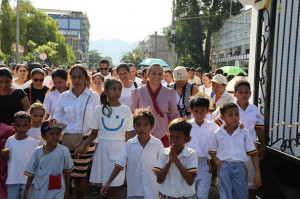
World Portuguese Language Day was also celebrated in various schools across the country with cultural activities, poetry recitations and moments to celebrate linguistic diversity, promoting among students the recognition of the Portuguese language as an instrument of identity, communication and openness to the world. END 